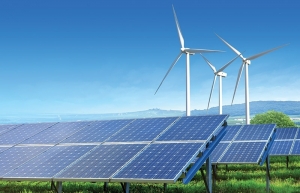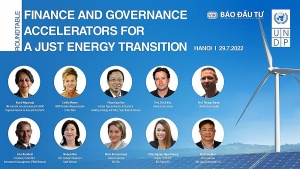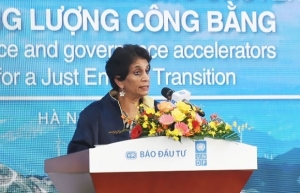Localisation the key for offshore venture victories
Vietnam only currently boasts wind farm projects in operation near the shores. Meanwhile, offshore equivalents are rather new. What does your company consider the challenges to be in the energy transition in the Vietnam market?
 |
| Riccardo Felici, country manager for renewables consultants OWC Vietnam |
Every emerging market has challenges to overcome, and these cover different sectors of the industry. Our benefit is to have seen these challenges in several emerging markets such as Taiwan, Japan, South Korea, and Poland.
The main challenges that can be foreseen for a truly offshore industry development are policy stability, including remuneration schemes, power grids, and supply chain.
Offshore projects are complex projects developed from several miles up to a hundred miles off the coasts. The benefit is better wind resources and larger spaces that allow for very large turbines to be installed. As the size of the projects is significantly larger than onshore projects, the scale of investment and involvement of international finance is also larger.
To attract the necessary investment, stable supporting policies (from financial, environmental, and planning perspectives) and certainty on the remuneration scheme from the government are critical. These are currently being put in place in Vietnam and the outcome of the Power Development Plan VIII (PDP8) will be critical to encouraging this new industry in Vietnam.
The power grid will need to also be developed to be able to accommodate the production of variable renewable energy at the national level. Large investments are expected in this area and the potential to allow private investment into the grid system could play a vital role in this.
Finally, Vietnam will need to prepare its supply chain in terms of main component fabrication, port facilities, construction plants, and equipment, including vessels to be able to build and operate the 7GW and more of offshore wind proposed by 2030 in the current PDP8 draft.
The opportunities for Vietnamese suppliers and contractors can then arise not just within Vietnam itself, but across the wider international marketplace in offshore wind projects.
With your experience in many other markets, what lessons can you share with Vietnam?
There are several lessons to be shared and applied to the market. We could talk extensively about each of the different packages that form a wind farm. If we had to point to two of the main ones we would think of localisation requirements and setting achievable goals.
Starting from the latter, though it may seem great to set very high development targets, for the first years the focus should be on building experience and supply chain that will be used by the larger pipeline in the following years. The failure to deliver very large projects or extensive delays comes with the lack of confidence of investors in the market which in turn reduces the overall feasibility of the larger projects.
Localisation is key to be built in the projects, however, we have seen over and over how this can lead to very challenging and expensive projects. Vietnam has great internal resources in engineering, and manufacturing and has the foundations for the installation capabilities thanks to its oil and gas projects. The industry will naturally be drawn to these resources.
It will, however, be critical to have international practical expertise in the projects at different levels to ensure that we don’t repeat the same mistakes again – appropriate partnering to get the best from local capabilities and international experience will provide a solution for Vietnam.
Oslo-based ABL Group, the parent of OWC, has already built up a presence in Vietnam’s renewable market. How has performance been so far here?
ABL Group has supported Vietnam in the energy, oil and gas, and maritime sectors for nearly 30 years. As Vietnam started to develop nearshore wind projects it was a natural transition to support the supervision of their construction and ensure that the highest standards were applied for the lowest risk and ensure the project’s success.
OWC then started to support developers at the earlier design and development stages. Nowadays, OWC and ABL’s wider group track record in Vietnam covers onshore wind, battery energy storage systems, and nearshore and offshore wind. This has been achieved for both local and international developers as well as working for development banks.
The expansion of the group with a new office was inevitable given our continued and increasing support of the market.
Our vision is to support the growth of the renewable energy market to achieve net carbon goals set by the government. Also, our ambition is to do so from Vietnam with a local team of experts who will gain invaluable exposure to our international projects to then bring the lessons learned to the local market.
Vietnam has tremendous potential in renewable energy with great resources, increasingly large energy demand and a growing supply chain. The stage is set for Vietnam to become a leader in Asia-Pacific for the development of new renewable energy.
 | Realising Vietnam’s just energy transition Vietnam is set to achieve net-zero by 2050. The announcement by Prime Minister Pham Minh Chinh at COP26 in Glasgow was a turning point in the country’s journey to sustainable development. The seriousness of intent and purposeful planning towards this net-zero commitment, with related pledges on reforestation and phasing out coal, has established Vietnam as a leader in the global effort to reduce carbon emissions and limit the negative impact of climate change. |
 | UNDP roundtable to tackle energy transition financing On July 29, the "Finance and Governance Accelerators for a Just Energy Transition" roundtable hosted by Vietnam Investment Review in collaboration with the United Nations Development Programme (UNDP) in Vietnam will dig into policy options on financial development toward a just energy transition. |
 | Finance and governance accelerators for Just Energy Transition Initial results of the energy transition to date have proven that finance is not a constraint and that new governance solutions are key to a Just Energy Transition (JET). |
 | Nation’s net-zero aim given strategic boost Vietnam’s fresh national climate change strategy, which highlights a crucial energy transition, will help the country reduce greenhouse gas emissions and fulfil its international commitment. |
What the stars mean:
★ Poor ★ ★ Promising ★★★ Good ★★★★ Very good ★★★★★ Exceptional
Related Contents
Latest News
More News
- Bac Ai Pumped Storage Hydropower Plant to enter peak construction phase (January 27, 2026 | 08:00)
- ASEAN could scale up sustainable aviation fuel by 2050 (January 24, 2026 | 10:19)
- 64,000 hectares of sea allocated for offshore wind surveys (January 22, 2026 | 20:23)
- EVN secures financing for Quang Trach II LNG power plant (January 17, 2026 | 15:55)
- PC1 teams up with DENZAI on regional wind projects (January 16, 2026 | 21:18)
- Innovation and ESG practices drive green transition in the digital era (January 16, 2026 | 16:51)
- Bac Ai hydropower works stay on track despite holiday period (January 16, 2026 | 16:19)
- Fugro extends MoU with PTSC G&S to support offshore wind growth (January 14, 2026 | 15:59)
- Pacifico Energy starts commercial operations at Sunpro Wind Farm in Mekong Delta (January 12, 2026 | 14:01)
- Honda launches electric two-wheeler, expands charging infrastructure (January 12, 2026 | 14:00)

 Tag:
Tag:




















 Mobile Version
Mobile Version